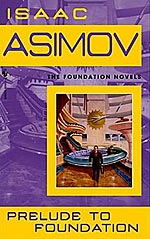
![]() verkisto
verkisto
7/26/2016
![]()
As I've been reading this series, I've seen several discussions on the order in which the entire Foundation series should be read. Asimov himself, in the foreword to this volume, gives a chronological order in which the books take place, from the Robot books to the Empire books, through the Foundation books. He doesn't necessarily say that the books should be read in this order, but he does clarify the timeline in which they all take place. What's interesting to me, though, is the folks who vehemently say the books should be read in chronological order. It doesn't make any sense to me. As for why, well, I'll get to that as soon as I make a spoiler warning. Stop here lest you learn too much.
A handful of the major revelations of the series -- from the identity of Aurora and Earth to the reveal that the robots are a part of the Foundation series -- are revealed here in this novel. And while Asimov hinted at the existence of robots in the last two volumes of the series proper (not counting this one and the next one), he never really made it a full reveal until volume five. Were readers to start here, they wouldn't have that wonder about the mystery.
As I was reading some further discussions on the Internet about the proper reading order, one comment stood out to me, that stories are told in a particular order, and that each succeeding part of the story builds on what has come already. Even if the story doesn't take place in that order, the story is told in that order, and that's what's important. And I agree wholeheartedly. I can't understand how anyone could be familiar with this series and recommend it be read in chronological order.
Prelude to Foundation deviates from the regular story to tell us a bit about Hari Seldon and how the idea of psychohistory was seeded in his brain. It reads more like a technical adventure novel than a groundbreaking, world-building science-fiction novel, but it's readable and entertaining. The ideas behind this particular story is less intriguing than those raised in the first five books, but if I have to suffer some mindless fiction to get an entertaining read, then I'll take it. My biggest complaints about the first five volumes were regarding how dry and uninteresting (story-wise) they were.
I was pleased to see that Asimov took a more progressive look at women in this novel. Myself, I saw it as an apology of sorts for how he had regarded them in the previous five books, but that's just me. Regardless, he devoted a good chunk of the book to portraying a society where women were truly subservient and submissive and showed the other characters' outrage at such treatment. I'll take it.
Asimov still stuck to the same theme that he had grasped so far in the series, where very little about the world in his series is about free will. There are still grand orchestrations behind the scenes that result in the major changes that take place, and it seems odd that these changes are brought about by one individual. Not having read the Robot stories, I'm at a bit of a disadvantage as I try to place Daneel's motivations for orchestrating such a move, but it does make a bit of sense. If a robot is entrusted to protect humanity, then wouldn't it make sense for it to go to such lengths to do so?
I have one more to go in Asimov's series (and, in true form, I couldn't resist getting the Brin-Binford-Bear trilogy to wrap all of it up), and I won't lie: I'm looking forward to being done with it. Having come this far with it, though, I'm not willing to not see it all the way through. Plus, if I was as entertained by this volume as I was, shouldn't I expect the next one to be even more entertaining?